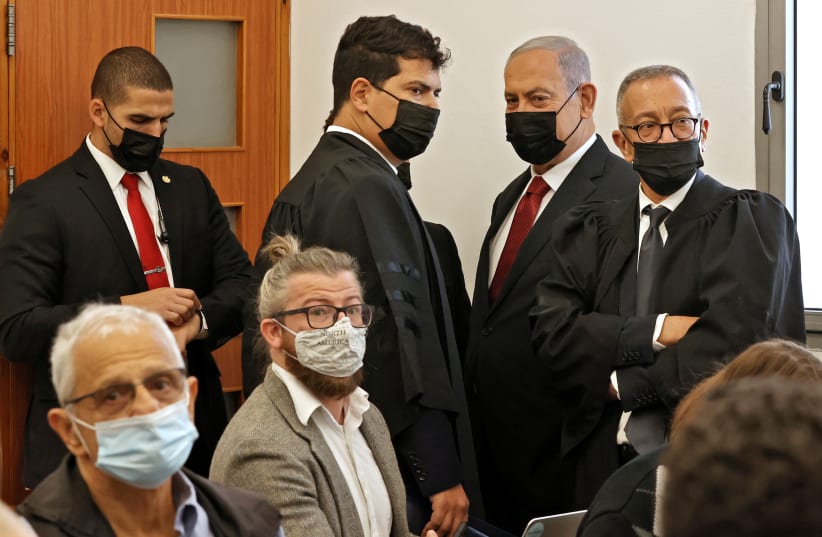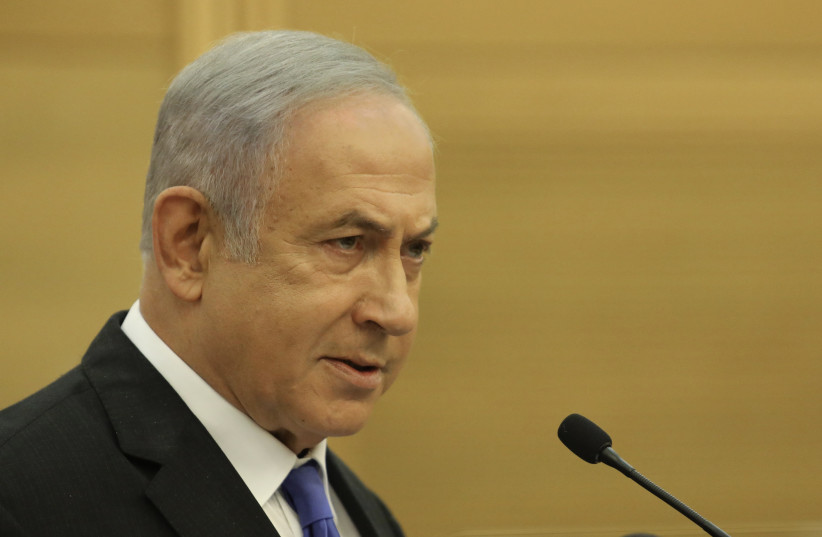It’s no accident that Benjamin Netanyahu had been Israel’s longest-serving prime minister until he was ousted earlier this year by the peculiar anybody-but-Bibi coalition.
In part, it's Netanyahu’s ruthlessness; his willingness to cross the line into areas into which other politicians would hesitate to venture that explains his unprecedented political success.
One of the best examples of Bibi’s take-no-prisoners approach was connected with the opening of his 2020 trial for breaching trust, accepting bribes and fraud, explains author Kave Shafran, a veteran journalist who has served in the Prime Minister’s Office preparing senior officials for public appearances. It took place in the Jerusalem District Court building.
The PM wanted to avoid any politically ruinous pictures of him sitting on the defendant’s bench in court or even arriving at the building, the author writes. The judge, however, had ruled that the PM had to be present at the beginning of the trial.
The Courts Administration, however, had agreed to provide him and his staff a place “to rest” prior to the start of the trial. It was located on the third floor, one floor above the official courtroom.
On the day of the hearing, Bibi arrived by limousine and drove into an opaque tent set up next to the courthouse. This was done ostensibly “for security reasons”; whatever its justification, it prevented photographers from snapping him going into the building. Also entering the courthouse through that same portal were the private TV film crew he had hired and courtroom props.
Journalists, who were waiting on the second floor, were forbidden from going up the stairs to the third floor – that old bugaboo, security, was used as the pretense.
In the third-floor room, the PM gave a speech filmed by his own crew. With no alternative available, Israeli TV stations telecast the Bibi-paid-for presentation.
When he descended to the real courtroom, Netanyahu kept his back to the cameras and didn’t sit down on the defendant’s bench until the judges had arrived and cleared the room of photographers. Again, mission accomplished – no photographs.
But by examining actual speeches and other documents, replete with notes that Bibi wrote to himself, the author shows that Bibi’s successes depended less on his controversial actions and more on his ability and hard work.
Netanyahu simply out-thought and outworked his political rivals, obsessively trying to perfect the smallest details of his public appearances.
To reach his goal, nothing was left to chance. Reminders to himself about everything, from gestures to the use of body language, can be found in the notes in the margins of Netanyahu’s speeches. It was all scripted.
Language – his choice of words – of course, underlies everything.
Uber meticulous, he and his staff composed dozens of drafts for speeches. For his controversial speech to the US Congress in 2015, Bibi claimed to have gone through 50 drafts, Shafran says.
The former PM uses many “rhetorical and stylistic methods” to move the audience to identify with him, the author notes. “These include use [of]... compliments, questions, emphasizing the common denominator, personal attention, and stories... ”
To connect with the audience, Bibi often talks in the first person to second person plural. “Allow me to share with you...,” “I promise you.” He also uses the first person plural “Our soldiers” or “We all believe.”
Bibi considers gestures an important tool, making liberal use of them. “When he describes economic growth, his hands always make an upward movement. When he talks about constricting terror activity, his hands draw close to each other... Increasing budgets – he spreads his arms wide. Palestinians shooting missiles – his hand depicts an arc in the air.”
He has a makeup artist and in 2010 spent NIS 100,000 on makeup and hairstyling.
Of all the images that explain Bibi’s success, perhaps the most important is Netanyahu as “guardian and protector” of the nation, “Mr. Security.”
“Every election campaign that Netanyahu leads is – from his point of view – a matter of life and death,” according to the author.
When he talks about the dangers to the state of Israel, however, it’s not a trick. “He is convinced that history has appointed him, Benjamin Netanyahu, to save the Jewish nation from another holocaust.”
It would be better if voters ignored politicians’ images and concentrated on substance instead. But that’s not reality. Studies have shown time and again that it’s the sizzle, not the steak, that gets voters’ attention.
In that realm of polishing one’s image, Bibi is tough to top. ■
The writer’s memoir, Figs and Alligators: An American Immigrant’s Life in Israel in the 1970s and 1980s, can be purchased online.
MASTER OF INFLUENCEBy Kave Shafran320 pages; $14.99

